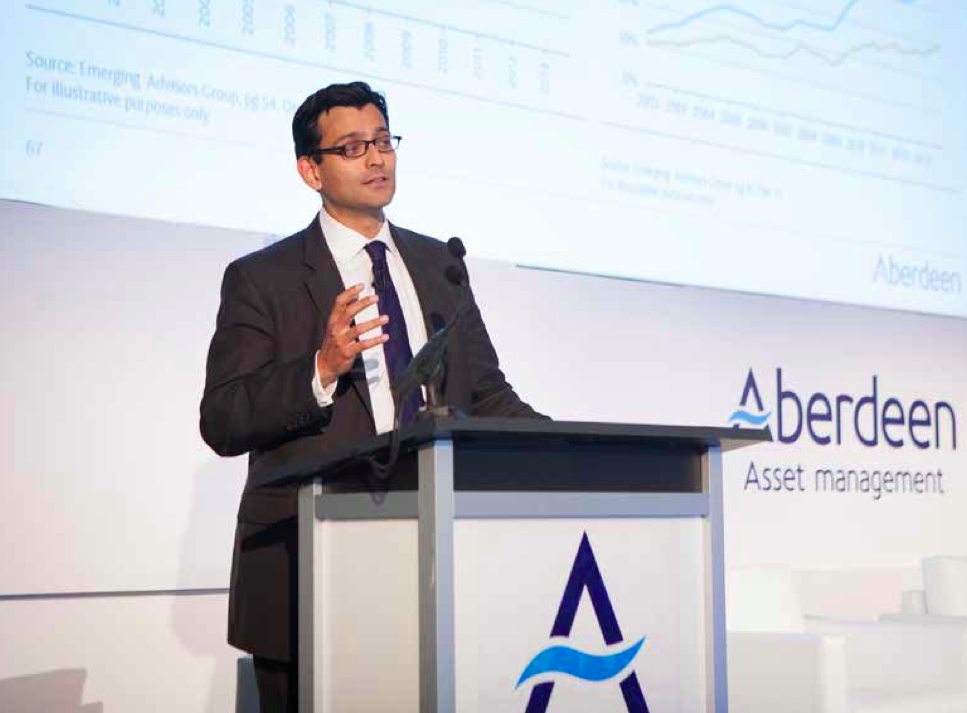Devan Kaloo is Aberdeen’s Head of Global Emerging Markets – Equities. He is also de portfolio manager of Aberdeen’s Latin America Equity Funds, for which he has been rated by Citywire as the most consistent portfolio manager over a 5 year period in the Latin American Equities arena. Aberdeen’s successful Global Emerging Markets Equity team, headed by Kaloo, is responsible for a series of strategies including the popular Emerging Markets Equity strategy, at capacity currently, and the Emerging Markets Infrastructure Strategy.
This is a summary of the ideas exposed by Devan Kaloo, speaking at the Aberdeen Investment Conference, “Home and Away: Why a Global Investment Approach Makes Sense,” in New York City on June 2014
According to Kaloo, there are three key reasons why investors have been wary of emerging markets:
1. Tapering. The Fed is printing less money, meaning that scarcer money is causing a rise in interest rates and a rise in the cost of capital for emerging markets.
2. China. Growth in the world’s second-largest economy has slowed significantly (Chart 1). As growth slows, the Chinese government continues to pump in fixed asset-led investment to stay about the 7% gross domestic product (GDP) growth standard, which can potentially lead to asset bubbles.
3. Earnings. Emerging market corporate profitability has declined since 2010 (Chart 2), whereas the profitability of developed market companies remains flat.
The China Syndrome
Even as EMs continue to pick up steam and recover from the woes of 2013, the slowdown in China is still very much on investors’ minds. According to Kaloo, a major crisis in China would arise in one of two scenarios: a liquidity crisis caused by depositors fleeing and a banking collapse, or a solvency crisis caused by unbearable debt. “In the case of China,” Kaloo said, “the likelihood of either of those crises actually occurring is pretty minimal.” China’s financial system is funded domestically, and the Chinese government is to cover outstanding debt. Overall, Kaloo believes that fears over a hard landing in China are “overblown.”
Doctor, is there hope of a recovery?
Kaloo noted that emerging markets—like their developed market counterparts—have not been immune to downturns. Over the past two decades, they suffered the 1994 “tequila crisis” in Mexico and the 2007-09 global financial crisis (Chart 3). Kaloo argued that the recent downturn is similar to the others—cyclical, not structural, and likely soon to pass. “Somehow we always seem to stagger back,” Kaloo said. “When you actually look at any longer track record for emerging markets you can see that despite the volatility, despite the risks, emerging markets have been a better place to invest for the longer term than developed markets.”
Elaborating on the cyclical nature of the latest downturn, Kaloo pointed to the post-crisis growth of emerging economies. After the crisis, EMs (and the companies within them) grew quickly. This resulted in a sharp rise in imports, paired with flat export growth—an unsustainable model, in Kaloo’s view. On the upside, trade balances have improved since the start of 2014 and have mainly balanced, with EM (ex-China) slightly outpacing the “fragile five”— India, Indonesia, Turkey, South Africa and Brazil.
For much of 2013, investors worried about the future of those countries. In 2014, their economies have improved dramatically. In Kaloo’s view, these economies have been forced to tackle their issues “the old-fashioned way”—by slowing the growth of credit and raising interest rates.
Looking forward
Kaloo concluded that being negative on emerging markets is the popular but misguided view of the moment. “What is happening in emerging markets is a cyclical adjustment,” he reaffirmed in closing. “These things happen. The cost of capital is going up and it’s forcing discipline on many companies and countries and they are adjusting.” Emerging markets continue to see an emergence of a new “business class” who understand what is necessary to build a profitable business.
Kalooreinforced that investing in emerging markets is always about companies, not countries. With emerging market companies refocusing on their operating margins, he expects profits to improve significantly within a year. Citing improving balance sheets, hopeful election results and a return to profitability, Aberdeen’s Head of Global Emerging Markets finally assigned a positive prognosis: emerging markets are alive and kicking.
Devan Kaloo joined Aberdeen in 2000 on the Asian portfolio team before becoming responsible for the Asian ex Japan region as well as regional portfolios within emerging market mandates and technology stocks. Previously, Devan worked on the North American desk before transferring to the global asset allocation team and then Asian portfolios. Devan graduated with a MA (Hons) in Management and International Relations from The University of St Andrews and a postgraduate degree in Investment Analysis from The University of Stirling.


